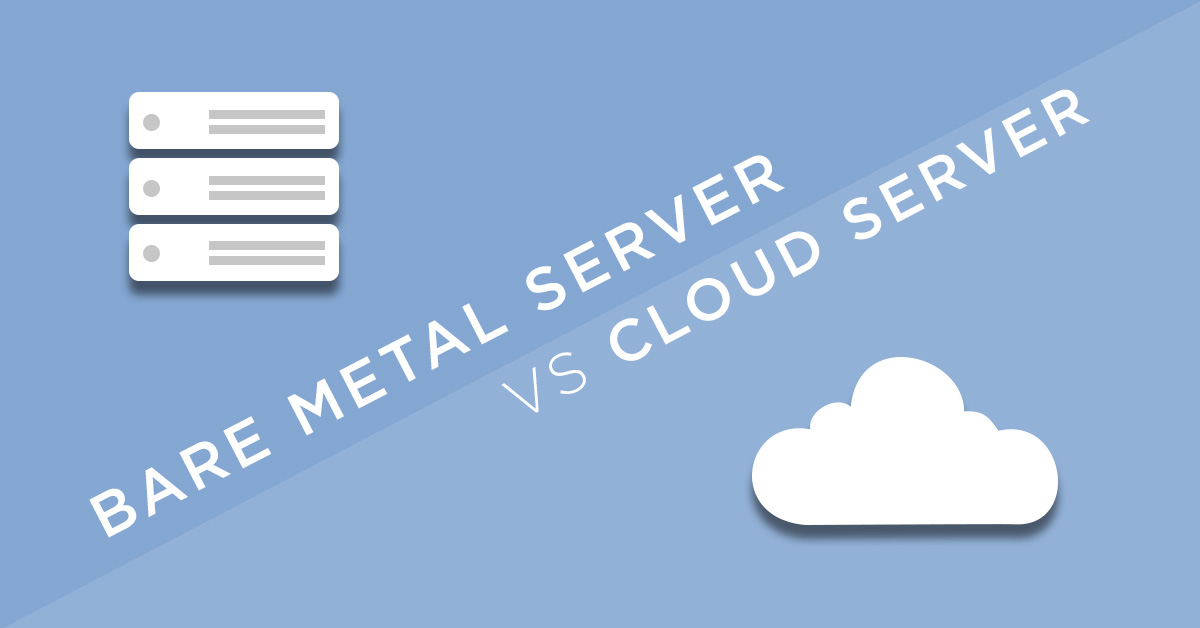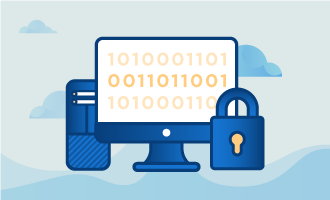
What differentiates a bare metal server against a cloud server? You’ve heard about cloud servers everywhere but do you know if they really are better than bare metal servers?
The basic differences between bare metal servers and cloud servers
The bare metal server

The bare metal server is traditionally known as a dedicated server or a physical server. It’s installed within a datacenter in a controlled and highly monitored environment.
The server dedicates all it’s hardware resources (CPU, RAM, Storage, Network port) to a single tenant, you. You keep a dedicated access to all ressources and you don’t have to deal with performance variations and degradation.
Pros
- Full hardware performances
- High level of security – Single tenant
- Lower storage cost
Cons
- Higher price
- Customizable
- Not auto-scalable
The cloud server
When you buy your cloud server you get a virtualized server. This server is using a portion of the CPU, RAM and storage on it’s host machine.

The host machine shares it’s resources with multiple virtual instances. They each get a portion of CPU, RAM and storage.
The cloud server, in the more popular configurations, receives a small portion of a bigger shared network storage. Rarely the cloud servers obtain a storage block from their compute node host.
We must stay aware that the word Cloud is often overused. When I talk about a public cloud I refer to an infrastructure generated from multiple compute nodes and a centralized storage system. We must not consider a VPS hosted on a single dedicated server a cloud instance.
Pros
- Highly customizable
- Lower cost – Not paying for idle hardware
- Less hardware failure – Runs on HA infrastructure
Cons
- Hardware resources shared with others
- Network configuration limited
Let’s go deeper in terms of CPU
When we compare the processor aspect of a cloud server and a dedicated server that have similar amount of cores and clock speeds the results are clear and obvious. Your dedicated server will outperform the cloud server because it has physical and direct access to the processing resources.
The dedicated server also has quicker and priority access to the processor cache as-well.
You also need to know that a single core of the latest generation of processors will often carry multiple threads per core. A vCPU however is a thread rather than a core.
That being said, not all hosting providers give you the same CPU model. And all CPU model does offer different frequencies.
Storage Wise
Generally the bare metal server uses local storage and the cloud server likely uses a network attached storage block.
Both can also be using HDD as well as flash-based (SSD) storage. All hosting is different here, depending on the technology and hardware used, and the QoS applied.
The main difference is that a bare metal server will use it’s own storage devices, with all the resources available for it. The cloud server uses shared storage with a bunch of other users.
We know cloud servers are sharing a pool of resources with other users. Because of that Quality of Service rules are implemented to deliver stable IOPS (input/outputs per seconds) to each cloud instance. Different packages may provide different QoS as well. Subsequently, the type of storage used will vary.
A caveat of shared pools of resources is that degradation of performance can be experienced if you have noisy neighbours on the same infrastructure.
What about the flexibility for bare metal servers compared to cloud servers?
You must now know the main highlight of a cloud server compared to it’s bare metal alternative; deployment. You can deploy cloud servers almost instantly whereas physical machines take longer to provision.
Cloud servers also have the possibility to “resize” your instance. You can increase your resources as you need them be it CPU, RAM or Storage.
When you choose to increase your storage capacity you generally can’t resize it back down afterwards. However, resizing quickly is a good option especially for your growing projects.
How can we help you?

As a cloud server provider, we put a wide range of public cloud servers at your disposal. We designed an OpenStack based cloud infrastructure. We built it with passion and using state of the art components for peak performance throughput.
GloboTech cloud servers allow upgrade of CPU and RAM ressources independently of the storage capacity. By keeping the same storage size, GloboTech customers can simply resize the CPU + RAM when needed. Then, revert their original ressources.
Pay only for the resources allowed to the instance – Cloud servers at GloboTech are getting charge hourly.
You have a good advantage choosing one of our cloud products; you get your own private network within our cloud infrastructure. This enables you to design your own virtualized clusters for different types of workloads and increased redundancy.
If you need increased security we provide you with a security group system that you can customize to your needs. This system acts as a firewall outside of your virtual resources where you can restrain inbound and outbound access to specific ports. We also offer SSH key access at the creation of your server for added security.
What if use a dedicated server instead?
Your dedicated server allows you for a lot more flexibility in terms of possible upgrades. You can generally schedule a quick maintenance for hardware swaps mainly for CPU or RAM at any time with minimal downtime involved.
When we think about storage we can leverage the use of Software Raid 1 to increase the size of a storage array with minimal impact on service availability.
You need a private LAN between your dedicated servers? We’ll provide a private network interface of 1GBps or 10Gbps depending on your needs.
We are known to always find solutions to suit our customer’s various needs and do our very best to adapt our hosting offer to fit your most precise requirements.
Okay, so what’s best for me?
It’s all up to you. All things considered both types of infrastructure have their strong and weak points. We are qualified to help you tailor a solution that maximizes your budget while giving you the best infrastructure for your needs.
For smaller projects, which require shared hosting or VPS, a small cloud server can be perfect for your needs as they can grow on the same infrastructure for quite some time.
For more significant requirements, the full raw power of a dedicated server may be necessary.
It all depends on your own specific needs and what you want in terms of features.
If you are still unsure which platform to select for your requirements get in touch with our team! We will be more than happy to assist you and will walk the extra mile to provide you with a solution that fits your needs and budget.

 Call us at 1-888-GTCOMM1
Call us at 1-888-GTCOMM1



